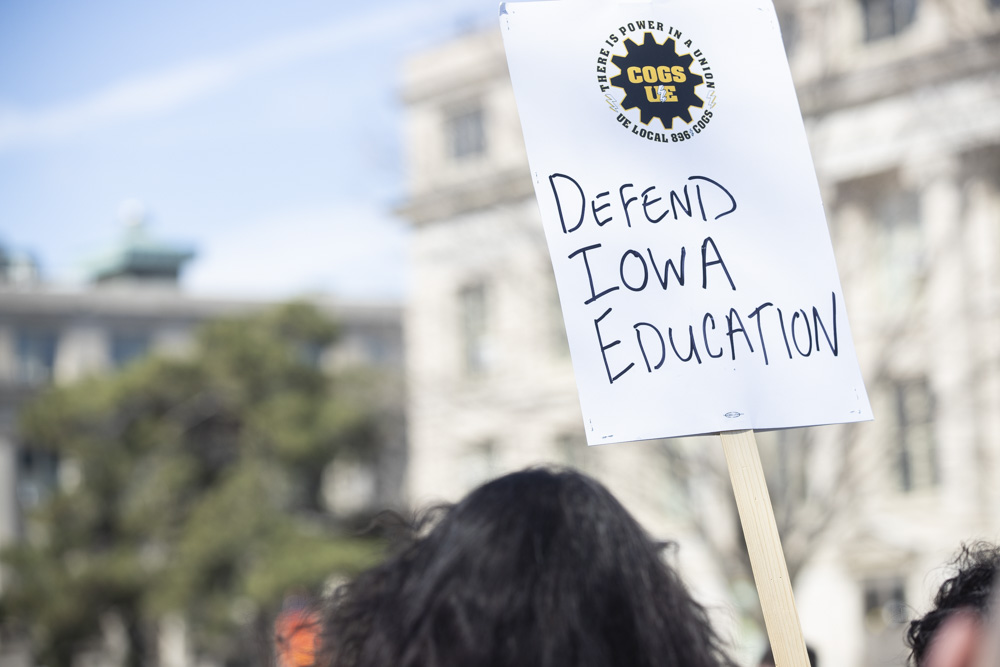
Ethan McLaughlin
A protester hold up a sign during a COGS protest on the University of Iowa campus in Iowa City on Wednesday, March 26.
Many teachers and students are uncertain about what anti-DEI laws, such as the most recent bill passed by the Iowa Senate to eliminate all forms of DEI in city and county offices, mean for those studying and working at Iowa’s public universities and how universities can resist these laws.
To offer clarity and context around the recent legislation and how it impacts Iowa’s public universities, the University of Iowa’s graduate student union, the Campaign to Organize Graduate Students, collaborated with local organizations to sponsor the “Teaching Beyond Fear” webinar.
The webinar featured a pre-recorded video of the three speakers — Marie Krebs, Henry Hamilton III Esq., and Courtland Cox — alongside the opportunity for those attending the webinar to participate in a live discussion and ask their own questions.
Marie Krebs, a graduate student at UI’s School of Social Work and the managing director for the Great Plains Action Society, an indigenous led grassroots organization, was a recent target of the university when she refused to share a presentation she and a classmate had given on the experiences of students of color in the School of Social Work and Iowa’s new anti-DEI legislation.
While the presentation received positive feedback at the National Council of Social Work Education conference, upon returning to the university, Krebs described being harassed by the university to submit her presentation for review, which she refused to do.
“I definitely did not comply, and I encourage other folks to not comply to the best of their capacities,” Krebs said.
Although she was nervous to stand up to the UI, describing how she felt the university was accustomed to pushing people around, Krebs expressed her gratitude to have her community behind her, including COGS and Great Plains Action Society.
“I didn’t do this alone. I did this in community,” Krebs said.
Greg Wickenkamp, COGS’s press and publicity committee chair who was also leading the webinar, agreed with Krebs.
“Absolutely, and I think that’s what we’re going to have to do moving forward, those of us who want to preserve diversity, equity, and inclusion, and accessibility moving forward,” Wickenkamp replied.
And while many of the anti-DEI laws, such as Senate File 2435, which prohibits higher education institutions from holding DEI offices, have been passed and enforced recently, Hamilton, a civil rights activist and a licensed attorney, pointed out these laws exist in a larger context.
“This law was not passed in isolation, and we make a huge mistake if we look at these laws in isolation,” Hamilton said. “It’s still part of this pattern that we’ve seen to rewrite history, to undo civil rights advantages and advances, or to force this view that America’s success or Iowa’s success is largely the product of one race or one sex.”
This pattern of laws includes House File 802, which prohibits educators from teaching concepts related to sexism and racism. Senate File 2385, which stripped the Iowa Civil Rights Commission of most of its authority to protect civil rights and consolidated this authority to a government appointed director in the office of civil rights. And Senate File 496, which banned books that referenced LGBTQ+ topics from libraries.
RELATED: Iowa Senate passes bill banning all forms of DEI in city, county offices
Hamilton said the issue with many of these anti-DEI laws are unconstitutionally vague, which has caused much confusion, especially among faculty and staff, on what is allowed to be spoken about and taught.
He condemned Iowa’s Board of Regents President Sherry Bates’s comment that universities should do more to comply with, “the spirit of the laws and executive orders, not just the words on the paper,” explaining, “We’re a nation of laws, not men.”
“When one looks at these [laws] it’s so vague. It’s hard to give directions, but I think we can scrutinize the language and give some direction,” Hamilton said. “First of all, it doesn’t really apply to the individual that’s teaching. It’s likely what a court would hold is that it applies to the university.”
Hamilton concluded his portion of the webinar by discussing civil disobedience and reading a selection from Martin Luther King’s Letter from Birmingham Jail.
“There are two types of laws: just and unjust,” Hamilton read. “One has not only a legal but a moral responsibility to obey just laws. Conversely, one has a moral responsibility to disobey unjust laws. An unjust law is no law at all.”
Cox, a civil rights veteran who, at 19, joined the Student Nonviolent Coordinating Committee and helped organize the 1963 March on Washington, joined the webinar as well to provide insight from someone who participated in past movements to gain and protect civil rights.
For Cox, none of the legislation we’re seeing today is new, and we’re deeply connected to what took place in the 1960s.
“They are beneficiaries of what happened in the 1960s and 1970s and what people fought for,” Cox said. “But also, now they have to protect the gains that they made.”
As Cox explained, part of this is building a strong belief system and imagining the future that students want, working towards this, and understanding that it will take time.
“That is one of the things that young people need to learn is that, at the end of the day, it is going to take some time, and if you have a belief system, you will win,” Cox said.
